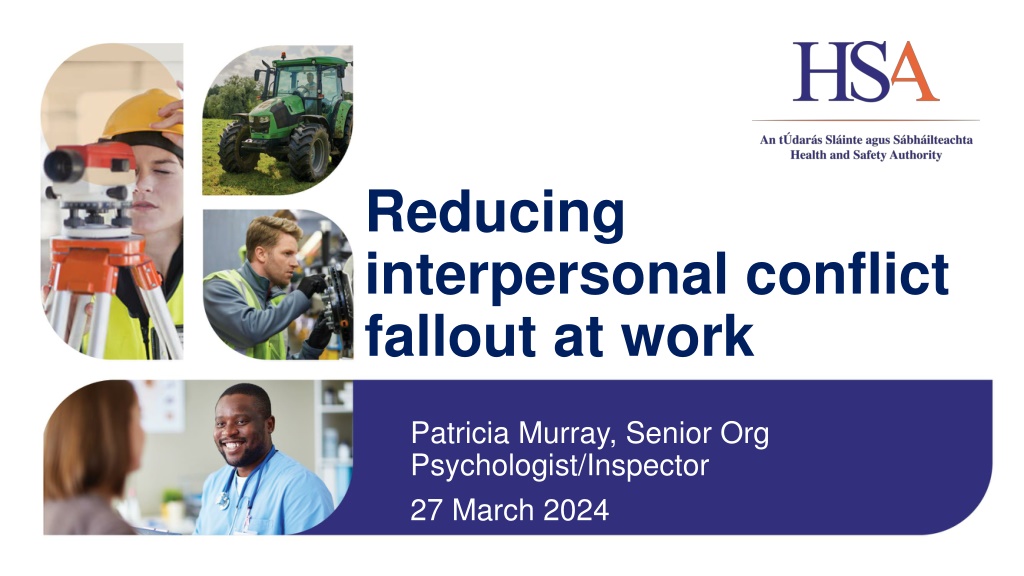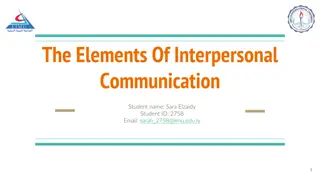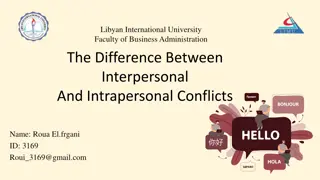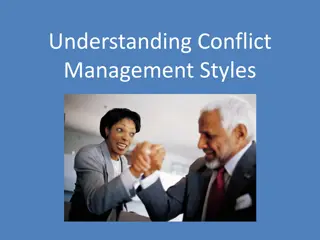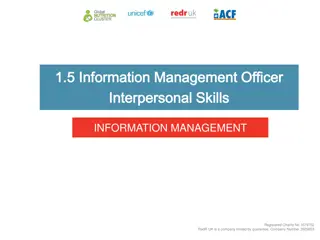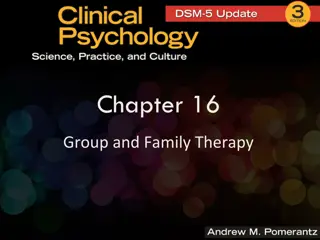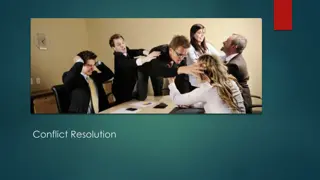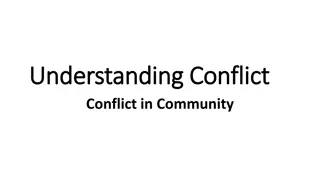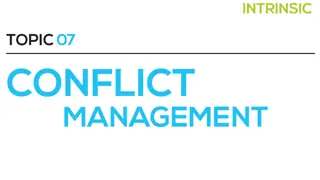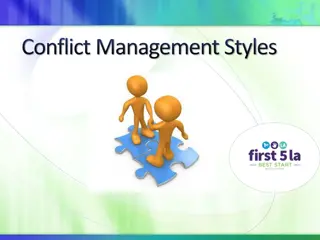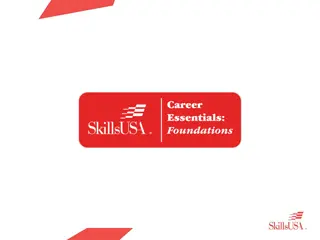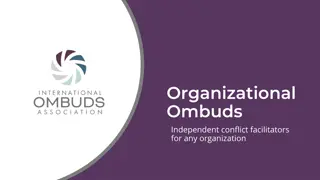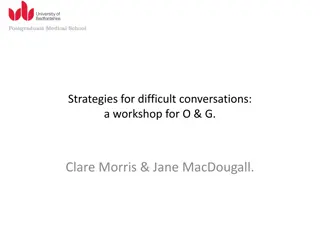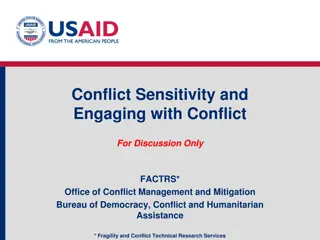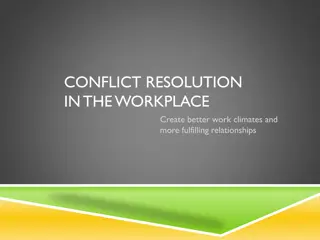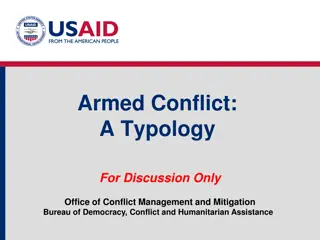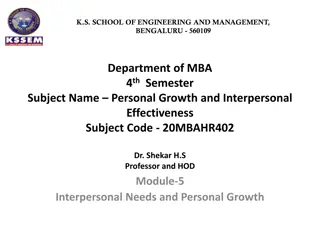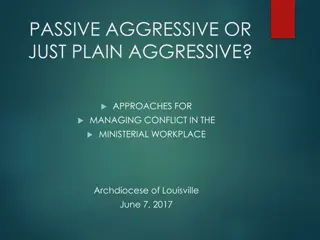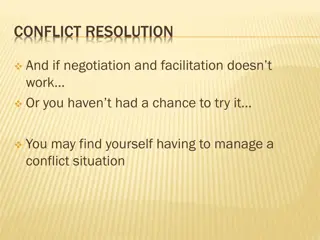Effective Strategies for Managing Interpersonal Conflict at Work
In this seminar led by experts in organizational psychology, attendees learn practical approaches to reduce interpersonal conflict fallout in the workplace. Discussions range from understanding individual and organizational factors influencing conflict to exploring remedies for resolving conflict escalation. Participants are encouraged to set personal goals, examine barriers to conflict management, and gain insights into improving their behaviors amidst inevitable workplace conflicts.
Download Presentation

Please find below an Image/Link to download the presentation.
The content on the website is provided AS IS for your information and personal use only. It may not be sold, licensed, or shared on other websites without obtaining consent from the author. Download presentation by click this link. If you encounter any issues during the download, it is possible that the publisher has removed the file from their server.
E N D
Presentation Transcript
Reducing interpersonal conflict fallout at work Patricia Murray, Senior Org Psychologist/Inspector 27 March 2024
Welcome to the Occupational Health Division Seminar QR Code for Slido
Seminar outline: 10 am - 12 noon My presentation, with Slido. The psychology of workplace conflict escalating to bullying .and remedies to resolve Ciara Kirwan presentation on H S A approach to managing bullying for healthier and safer systems of work: when the inspector calls. Dr Paolo Yaranon s presentation on his recent research into workplace conflict , negative behavior and bullying My summary wrap up offering solutions and recommendations with Q and A
Setting your goal To gain from session, commit to 3 things, now Think of you, doing your job, these days, rather than other people Be aware of your barriers in your approach to managing conflict Reflect on getting answers to the problems you identify, (not getting your already prepared answers reinforced) What we know: Conflict is everywhere, and cannot be avoided Increased understanding and insights help us practice better behaviors.
The individual at work The general psychological underpinnings of conflict: Individual and organisational Individual factors influencing everything, including potential towards conflict: Perceptions and biases - attribution and errors Labels and assumptions attention/intention Us V others thinking (in and out groups) expectation effects Cognitive style INTP Socio-emotional state and self awareness imagination and emotion
Moment out Are you recognising people you work with and know outside work?
Aha moment. They are recognising YOU!
The social context of work Organisational factors facilitating conflict: Unclear or ambiguous goals Unfair or unequal reward systems Competing resources for approval Lack of any feedback or metric on performance Over zealous and random performance appraisals lacking rigour Lack of opportunity for social interaction/face-to-face/non work engagement Badly designed teams Uncivil behavior normed and reinforced In and out groups
The broader context Different industry requirements not part of recruitment criteria Various and changing workplace cultures - wfh New and emerging types of work digital/platform Vulnerable workers Sensitive content work Health and Safety Legislation 2005 Act Other employment law and organisations (IHRC, WRC) Civil law Social norms and expectations
Environment influences us - examples Restaurant Driving Shopping Smoking Pro social behavior Anti social behavior Understanding these to reinforce prosocial and extinguish anti-social
Small conflicts cause stress Behavioural features associated with feeling stressed are: Confusing cues from others damages our perceptual and attribution frozen systems Perception of time alters (we do more rushing to catch up ) Short cuts in how we operate/what we do, no mental resources Errors in how we plan and think - executive functioning impaired, we make mistakes Reduction in social emotional consciousness Less sensitive Less benefit of doubt giving Less indulgent of others or prepared to take on another's perspective Reduction in capacity to be see, think, hear, feel*
On-going Stress A disturbing feeling-state lasting 6 weeks + Effects personal, social, psychological. What happens initially? (biological/physiological/feedback loop, cognition, emotion) Primary effect of a stressor - directly felt Secondary effects of a stressor effects+ via primary effects* Effects of once-off incident critical incidents of traumatic typology Effects of on-going, micro-stressors deep, wide reach Context influences effects supportive V antagonistic Context is you, your colleagues, other teams, leadership, organizational systems and culture
Pivot Points for Escalation* Working From Home: easier to escalate everything with no face-to-face: the freedom from consequences . Avoidance over time: nothing done for weeks/months after complaint: things escalate after a time lapse varies from 2-4 months but when stress gets chronic (on-going) Social self exclusion a secondary cause and effect, isolation can trigger escalating behaviour Increasing anger vacuum/lack of treatment main cause anger reduces abilities: neuroscience studies re decision making, seeking retribution and making bad judgements Overthinking/note taking about the conflict triggers cognitive dissonance leads to stress and more over thinking (rumination studies) Rumination leads to lack of sleep, a huge factor in mental malaise and depletion of civility, leads to chaotic escalation, at times
Recommendations and Solutions Stressful situations, sourced in conflict, need exaggerated antidote treatments The remedies are threefold: partly in the process itself, its robustness and trust in it, fairness, transparency - from a -> b -> c: applied ABP partly in the content (what options offered - within ABP) partly in the interpersonal relations/comms by the other person engaging on behalf of employer *
Recommendations and Solutions* Psychological development models - accommodation and assimilation Front load accommodating actions to the individual Reduce their need to adapt to the organisation or system - effort- reward imbalance Allocate times regularly, scheduled to suit them, and stick to those times, Reduce uncertainty by regular short, clear communications re arrangements Framing, nudges, priming towards positive and towards outcomes
Research Highly disturbing (social and emotionally challenging) events of an on- going nature which disrespect and undermine us cause emotional reactions which bypass our established cognitive purposeful actions-in- the-world. These are not easily managed in the legalistic, technocratic and latterly, remote workplace of today. The ability of people within the system (H and S/ HR, Supervisors and managers) to develop/manage a system which offers the three main remedies (engender trust, have robust system, use it carefully) can result in slow motion harmony being restored.
Slido again Next speaker, Ciara Kirwan
Which escalates conflict / bullying? 1. Little or no active supportive systems in place for employees 2. No or low levels of support available when something goes awry 3. No or low teamwork or collegiality at work 4. No relevant, meaningful tailored training to do the job properly 5. Time pressures and decisions required too quickly 6. Repeated prolonged exposure to over work 7. Difficult personal circumstances brought to work 8. Lack of management fairness and transparency 9. Lack of role clarity 10.Nobody taking responsibility when things go wrong
Solutions revisited People everyone sees everything differently: listen and learn Emotionality of the events what happened, when, where, how and finally why? Psychological safety and trust at that workplace/team/unit? Situational dynamics pressures of the context Cooperative environment, team cohesion is it there? Leadership is it visible, fair, and unbiased? Triggers - a good motive is not enough if the cue s promote conflict Systems in place: do they outline a route to bring people towards remedies?
All environment influences us Restaurant engagement type trumps the food (service) Driving signage nudges us to remember/is anyone looking? Shopping easy wins, food near the checkout, nappies and beer Smoking not awareness of negatives, help with cravings Pro social behavior what do other (my) people do and think? Anti social behavior where is the line and what alternatives are there? Understanding these to reinforce prosocial and extinguish anti-social
Next on-line event Psychological Safety at work, with me and ESB s Jennifer Grogan, April 23rd, 10 am-11.50 am April s webinar live on our website, Direct link to register on MS Teams is here. 2 free OH events in May in person, Limerick May 21st and Dublin May 23rd. See hsa.ie. Topics: Violence/aggression and Human factors/ fatigue, work-related stress and bullying Free WRS risk assessment at workpositive.ie on our website See below link to the free H S A Managing Bullying Complaints course, to register go to hsalearning.ie https://hsalearning.ie/mod/page/view.php?id=362.
